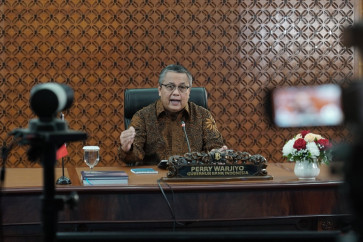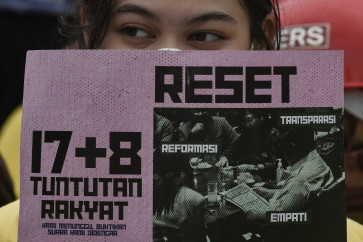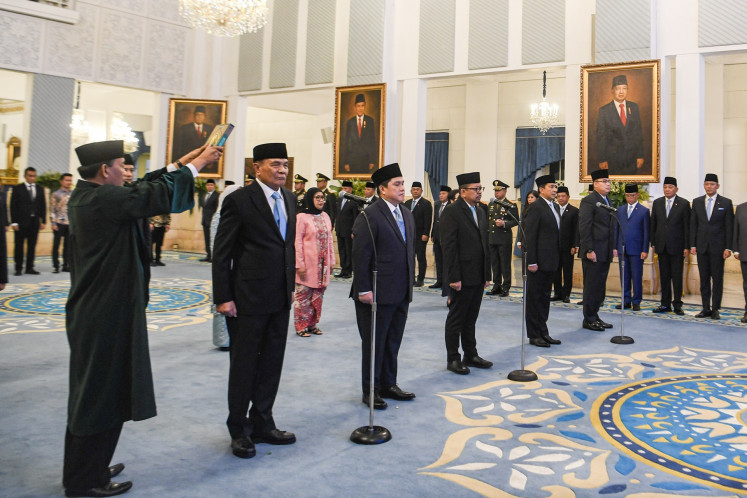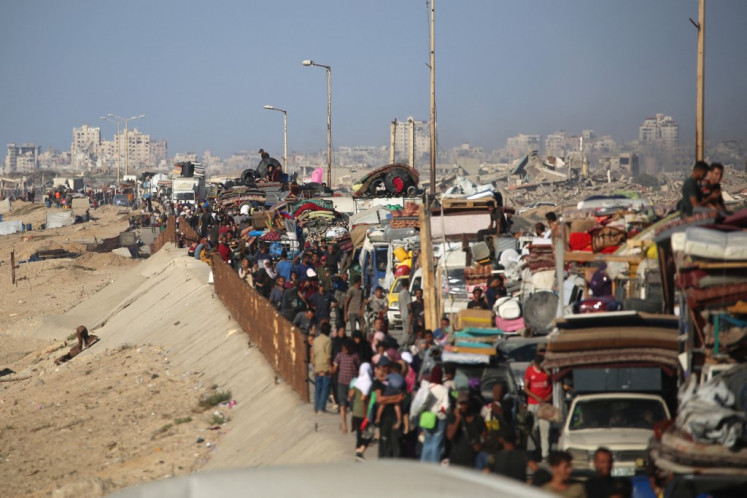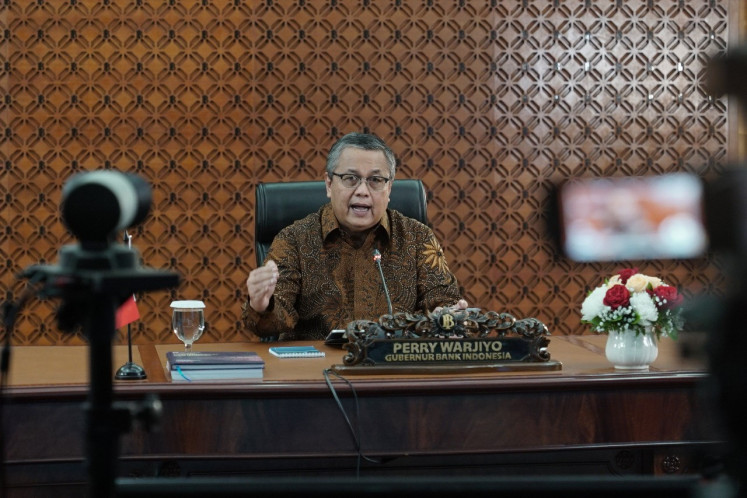Popular Reads
Top Results
Can't find what you're looking for?
View all search resultsPopular Reads
Top Results
Can't find what you're looking for?
View all search resultsPoll body commissioner arrested for alleged graft
Brewing scandal: General Elections Commission (KPU) chairman Arief Budiman (second right) and KPU commissioners Ilham Saputra (center), Pramono Ubaid Tanthowi (second left) and Hasyim Asyari (right) visit the Corruption Eradication Commission’s office in Jakarta on Wednesday following the arrest of KPU commissioner Wahyu Setiawan by the antigraft body the same day
Change text size
Gift Premium Articles
to Anyone
B
rewing scandal: General Elections Commission (KPU) chairman Arief Budiman (second right) and KPU commissioners Ilham Saputra (center), Pramono Ubaid Tanthowi (second left) and Hasyim Asyari (right) visit the Corruption Eradication Commission’s office in Jakarta on Wednesday following the arrest of KPU commissioner Wahyu Setiawan by the antigraft body the same day. (Antara/Indrianto Eko Suwarso)
The Corruption Eradication Commission (KPK) has arrested a number of corruption suspects in two different cities in the course of two successive days.
One of the arrested figures is General Elections Commission (KPU) commissioner Wahyu Setiawan who is suspected of accepting bribes.
KPK chairman Firli Bahuri confirmed the arrest, saying Wahyu had been detained during an operation in Jakarta.
“We have arrested figures suspected of giving and accepting bribes. [One of them is a] KPU commissioner identified as WS,” Firli told journalists on Wednesday.
However, he did not reveal further details regarding the arrest, as more information will be announced during a press briefing on Thursday.
The arrest is a blow to the poll body, which once squabbled with members of the House of Representatives over the former’s policy of barring former graft convicts from running in elections.
Nevertheless, it is not the first time an official from the country’s election body has been implicated in a graft case.
The KPK arrested a number of KPU officials in 2005, including then-chairman Nazaruddin Sjamsuddin, for bribery pertaining to the procurement of 2004 general election materials.
Nazaruddin was sentenced to six years’ imprisonment after appealing an initial ruling at the Supreme Court.
Arwani Thomafi, the deputy chairman of the House Commission II overseeing home affairs, said he deplored the arrest.
“We are asking election organizers at every level to stay focused on preparing for the simultaneous regional elections that are slated for September this year,” Arwani said in a statement.
Wahyu was the second public official arrested by the KPK under Firli, an active police officer whose election as KPK chief had stirred controversy.
One day prior to Wahyu’s arrest, graft busters arrested Saiful Ilah, the regent of Sidoarjo in East Java.
“The KPK has apprehended a regional leader and other parties in Sidoarjo regency in a case pertaining to the procurement of goods and services,” KPK acting spokesperson Ali Fikri said on Tuesday night.
He added that investigators had also seized money during the operation, although Ali did not disclose the amount.
Investigators took Saiful to the East Java Police headquarters in the provincial capital of Surabaya on Tuesday night, where he was interrogated. Dozens of others were also questioned in connection with the case at the police headquarters.
“I don’t know why I am being arrested,” Saiful said after being questioned on Wednesday as quoted by Antara.
The regent, as well as several other figures, was taken to the KPK headquarters in Jakarta on Wednesday afternoon to undergo further questioning.
As of 7:30 p.m., the KPK had yet to release further details on the Sidoarjo regent’s case.
Apart from being the KPK’s first arrests of 2020, these operations were the first since the controversial revision of the KPK Law. The regulation took effect in October after the House passed a revised bill following speedy deliberation.
The new law strips KPK commissioners of the status of investigators and prosecutors, potentially hindering the commission from carrying out operations to arrest officials, former KPK chairman Agus Rahardjo said.
The revised law also mandates the formation of the KPK’s supervisory council, tasked with overseeing the KPK and issuing approval for raids, wiretapping and evidence seizure by investigators. The council, consisting of five members, is expected to be fully functional after President Joko “Jokowi” Widodo issued a presidential regulation mandating the formation of the council’s executive body.
KPK deputy chairman Alexander Marwata said the investigation into Saiful had been started before the supervisory council was formed. “We have wiretapped him since before the council was formed,” he said, as quoted by Antara.
He added that the commission was drafting a technical guideline on the wiretapping of graft suspects following the formation of the supervisory council.


